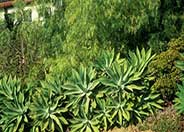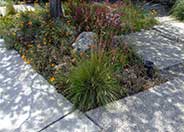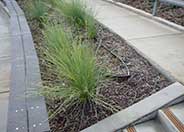
Common name:Fox Tail Agave, Velvet Agave
Botanical name:Agave attenuata
This Agave has a dramatic tropical form. Even light frost can damage its succulent leaves. It is great for containers. In the low desert, partial sun will be best. If it becomes top heavy, simply cut and stick in the ground to root. It is not a fast grower and has light green foliage. It will also die after flowering but pups around the mother will survive. Distinctive with its large rosette of leaves perched on a long curving trunk, it is a native from Mexico.

Common name:Olive
Botanical name:Olea europaea
This broad tree will grow to 40' tall and has small, gray green leaves with fleshy black fruit that appears in fall. Purchase fruitless varieties to avoid the mess.

Common name:Indian Hawthorne
Botanical name:Rhaphiolepis indica
This small shrub will grow 2' tall and 4' wide. It has small, dark green leaves that get a red tint in the winter and deep pink flowers that bloom fall through spring.

Common name:Fern Pine
Botanical name:Afrocarpus gracilior
Soft, narrow, pointed leaves on graceful arching branches characterize this plant. The foliage is gray green, and the plant can be used as an individual specimen, screen, or even a small tree.

Common name:Scarlet Trumpet Vine
Botanical name:Distictis buccinatoria
This evergreen vine is highlighted by large, blood red, trumpet-shaped flowers with a yellow throat. These flowers will continue to appear throughout the warm months.

Common name:Mueller's Fescue
Botanical name:Festuca muelleri
This Central European native fescue has shiny, dark green foliage that is slightly bluish green. It is a cool season grass that grows up to 8 inches tall and equally wide. If massed together it can become a lawn alternative.

Common name:Esparto Grass
Botanical name:Lygeum sparteum
This plant is a low ornamental grass with green stems. It has some salt tolerance and can be grown in sandy soil.
Designer:
Photographer: GardenSoft
Incorporate compost 6" into your soil to retain water, reduce compaction, feed earthworms, and provide valuable nutrients to your plants.
Attract, or buy beneficial insects such as ladybugs and lacewings to control pest outbreaks in your garden.